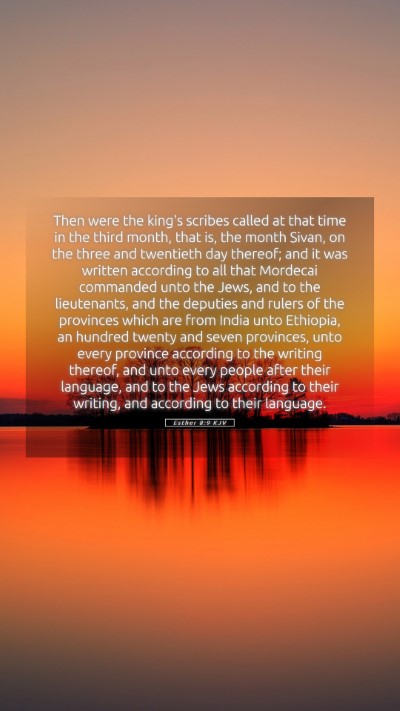Old Testament
Genesis Exodus Leviticus Numbers Deuteronomy Joshua Judges Ruth 1 Samuel 2 Samuel 1 Kings 2 Kings 1 Chronicles 2 Chronicles Ezra Nehemiah Esther Job Psalms Proverbs Ecclesiastes Song of Solomon Isaiah Jeremiah Lamentations Ezekiel Daniel Hosea Joel Amos Obadiah Jonah Micah Nahum Habakkuk Zephaniah Haggai Zechariah MalachiEsther 8:9 Meaning
What is the meaning of Esther 8:9?
Then were the king's scribes called at that time in the third month, that is, the month Sivan, on the three and twentieth day thereof; and it was written according to all that Mordecai commanded unto the Jews, and to the lieutenants, and the deputies and rulers of the provinces which are from India unto Ethiopia, an hundred twenty and seven provinces, unto every province according to the writing thereof, and unto every people after their language, and to the Jews according to their writing, and according to their language.
Esther 8:9 Bible Verse Meaning
Understanding Esther 8:9
Esther 8:9 is a verse that highlights the importance of decisive action and the power of communication in the life of God's people. This passage takes place after the victory of Esther and Mordecai over their adversaries and represents the newfound freedom of the Jews to defend themselves. The verse reads:
"Then were the king's scribes called at that time, in the third month, that is, the month Sivan, on the three and twentieth day thereof; and it was written according to all that Mordecai commanded unto the Jews, and to the lieutenants, and the deputies and rulers of the provinces which are from India unto Ethiopia, a hundred twenty and seven provinces, unto every province according to the writing thereof, and unto every people after their language, and to the Jews according to their writing, and according to their language."
Let's delve into the meaning and implications of this verse by drawing insights from various public domain commentaries.
Bible Verse Meanings and Explanations
-
Historical Context:
According to Matthew Henry, the period described corresponds to a significant turning point in Jewish history. After facing imminent destruction through Haman's decree, the Jews now received the authority to defend themselves. This decree illustrates the culmination of divine providence and human action working together.
-
Mordecai's Leadership:
Albert Barnes focuses on Mordecai’s pivotal role in this verse. His command leads to the writings that would go out to the Jewish people, showing his position not just as a relative of Esther but as a leader and protector of his nation. Mordecai’s boldness exemplifies how God elevates the downtrodden in moments of dire need.
-
Communication and Unity:
Adam Clarke emphasizes the importance of communication in this scenario. The decree was disseminated in the Jews' own languages and scripts, ensuring that every individual understood the gravity of their newfound rights and responsibilities. This attention to language unity reflects a deeper understanding of community needs.
In-depth Bible Verse Analysis
This verse serves as a pivotal moment in the narrative, illustrating how God turned a situation of despair into one of hope and empowerment. The careful examination of this story reveals several key themes:
-
Divine Timing:
As noted by commentators, events in Scripture often unfold with divine timing. The fact that this decree was sent out in the third month highlights the meticulous planning that God orchestrates in the lives of His people.
-
Authority and Power:
God’s providential hand is evident in how Mordecai was given authority, reflecting how spiritual redemption often comes through human agents acting upon God’s prompting.
-
Protection and Justice:
This writing was not merely a message; it was a legal document that provided the Jews protection against their enemies. The contrast between the former decree of Haman and this one showcases God's justice prevailing over wickedness.
Application of Esther 8:9 in Daily Life
Understanding Scripture: Esther 8:9 teaches that we should not underestimate the power of our words and actions. In times of turmoil, we have the ability to impact our communities positively.
Bible Study Insights: Consider how discernment and intelligence in communication allow us to convey essential truths to those around us. Whether it’s through speaking life to a friend or standing up for justice in our communities, the implications resonate deeply.
Cross-References
- Esther 3:12-13: Discusses Haman's original decree against the Jews.
- Esther 9:1-2: Relates to the outcome of the Jews defending themselves and the turning of the tide.
- Isaiah 54:17: "No weapon that is formed against thee shall prosper..." - A promise of God's protection over His people.
Conclusion
In conclusion, Esther 8:9 serves as a formidable example of how Scripture borne out of historical context can provide deep insights into leadership, communication, and divine providence. By studying such passages, we gain a richer understanding of Biblical exegesis and empirical applications of scripture to daily life.


